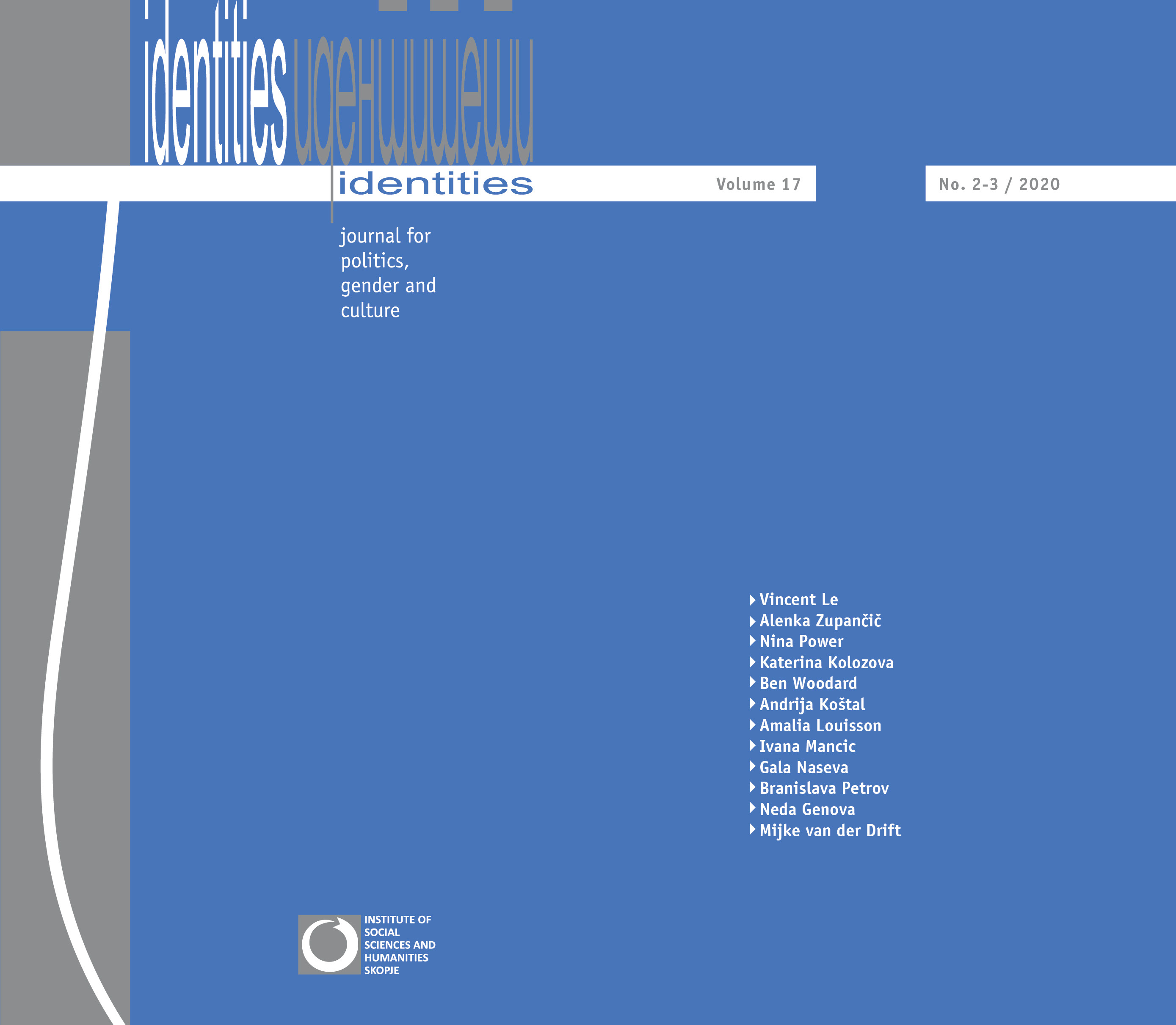Marxism without Philosophy and Its Feminist Implications: The Problem of Subjectivity Centered Socialist Projects (Transcript of a talk at the school authorized by Katerina Kolozova)
DOI:
https://doi.org/10.51151/identities.v17i2-3.464Keywords:
materialist feminism, François Laruelle, radical dyad, real abstractions, speculative realismAbstract
The non-philosophical conceptualisation of the self, and I am expanding the category to include the other forms of theoretical-methodological exit from philosophy’s sufficiency as its principle, thus also Marx, psychoanalysis, and linguistics, does not reduce the radical dyad of physicality/automaton to one of its constituents. It is determined by the radical dyad as its identity in the last instance and it is determined by the materiality or the real of the last instance. The real is that of the dyad, of its internal unilaterality and the interstice at the center of it. We have called this reality of selfhood the non-human: the interstice is insurmountable; the physical and the automaton are one under the identity in the last instance but a unification does not take place. It is the physical, the animal and nature, it is materiality of “use value” and the real production that needs to be delivered from exploitation, not the “workers” only, especially because many of the global labor force are bereft of the status (of workers). And the need to do so is not only moral but also political in the sense of political economy: capitalism is based on a flawed phantasm that the universe of pure value is self-sufficient on a sustainable basis, based on an abstracted materiality as endlessly mutable resource. A political economy detached from the material is untenable.
Author(s): Katerina Kolozova
Title (English): Marxism without Philosophy and Its Feminist Implications: The Problem of Subjectivity Centered Socialist Projects (Transcript of a talk at the school authorized by Katerina Kolozova)
Journal Reference: Identities: Journal for Politics, Gender and Culture, Vol. 17, No. 2-3 (Winter 2020)
Publisher: Institute of Social Sciences and Humanities - Skopje
Page Range: 40-46
Page Count: 7
Citation (English): Katerina Kolozova, “Marxism without Philosophy and Its Feminist Implications: The Problem of Subjectivity Centered Socialist Projects,” Identities: Journal for Politics, Gender and Culture, Vol. 17, No. 2-3 (Winter 2020): 40-46.
Author BiographyKaterina Kolozova, Institute of Social Sciences and Humanities - Skopje
Dr. Katerina Kolozova is senior researcher and full professor at the Institute of Social Sciences and Humanities, Skopje. At the Institute, she teaches policy studies, political philosophy and gender studies. She is also a professor of philosophy of law at the doctoral school of the University American College, Skopje. At the Faculty of Media and Communication, Belgrade, she teaches contemporary political philosophy. She was a visiting scholar at the Department of Rhetoric at the University of California, Berkley in 2009, under the peer supervision of Prof. Judith Butler. She is a member of the Board of Directors of the New Centre for Research and Practice – Seattle, WA. Kolozova is the first co-director and founder of the Regional Network for Gender and Women’s Studies in Southeast Europe (2004). Her most recent monograph is Capitalism’s Holocaust of Animals: A Non-Marxist Critique of Capital, Philosophy and Patriarchy published by Bloomsbury Academic, UK in 2019, whereas Cut of the Real: Subjectivity in Poststructuralist Philosophy, published by Columbia University Press, NY in 2014, remains her most cited book

Downloads
Published
How to Cite
Issue
Section
License
Copyright (c) 2020 Identities: Journal for Politics, Gender and Culture

This work is licensed under a Creative Commons Attribution-NonCommercial-NoDerivatives 4.0 International License.
Identities is published under the following license: Creative Commons Attribution-NonCommercial-NoDerivatives 4.0 International (CC BY-NC-ND 4.0). Under this license, users of our content must give appropriate credit to authors and source as well as indicate if changes were made, cannot be used for commercial purposes, and, in the instance that it is built upon or transformed, may not be distributed. For Identities, the copyrights allow the audience to download, reprint, quote in length and/or copy articles published by Identities so long as the authors and source are cited. For more information on our license, see the following: https://creativecommons.org/licenses/by-nc-nd/4.0.








